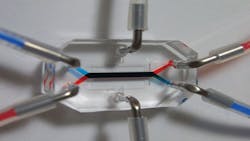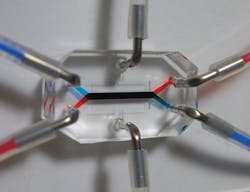Can 'Organs-on-a-Chip' Help Create Effective Drugs?
The FDA seems to think so and is willing to spend $5.6 million to find out.
Earlier this month the regulatory agency invested in research being conducted by the Wyss Institute for Biologically Inspired Engineering at Harvard University. Specifically the research is to find out if the Organs-on-Chips technology the university developed can be used to test human physiological responses to radiation, and to evaluate drugs designed to counter those effects. The effort will also be supported by a team in the Vascular Biology Program at Boston Children's Hospital.
The larger application of this technology is the ability to test drugs on human organs as opposed to using animals for testing. This avoids not only the ethical issue of animal testing, but provides accurate responses as often animal models fail to predict human responses.
The Organs-on-Chips are tiny, microfluidic devices that are lined by living human cells and mimic complex organ physiology. Cells are either donated or are extra cells from surgical procedures.
The institute has over ten different organs-on-chips in development according to its Founding Director Don Ingber, M.D., Ph.D (To view a video of Dr. Ingber talking about this technology click here.)
This technology has been recognized internationally for its potential to replace animal testing and as a new way to model human disease, test new drugs, and screen for environmental toxins.
The Wyss Institute received support for its organs-on-chips technology from the Defense Advanced Research Projects Agency and the National Institutes of Health, which led to the development of these devices.
About the Author
Adrienne Selko Blog
Senior Editor
Focus: Expansion Management & the Biotech & Life Sciences Industries
Email: [email protected]
Follow Adrienne on Twitter: @ASelkoIW
Call: 216-931-9235
Senior Editor Adrienne Selko manages IndustryWeek’s Expansion Management, delivering ideas and information about how successful manufacturers leverage location to gain competitive advantage. She explores the strategies behind why companies located their headquarters, research institutes, factories, warehouse and distribution centers and other facilities where they did, and how they benefit from the decision.
Adrienne is also the editorial coordinator of the IndustryWeek Expansion Management Roundtable events, which unites economic development professionals to network and discuss the latest trends in site location.
As well, Adrienne tells the stories of successful companies in the biotechnology and life sciences industries.
In the past, Adrienne has managed IndustryWeek’s award-winning website, overseeing eNewletters, webinars, and contributed content. Before joining the staff, Adrienne was managing editor of corporate publications at a large regional financial institution. She also ran a public relations and marketing company that published a best-selling healthcare book.
Adrienne received a bachelor’s of business administration from the University of Michigan and is especially interested in wellness and natural health.

